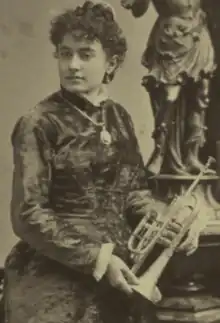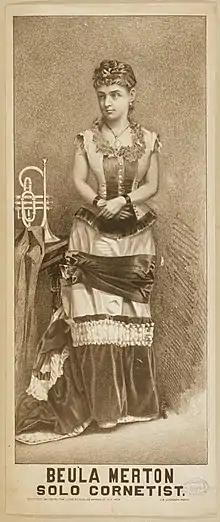Anna Theresa Berger Lynch
Anna Theresa Berger Lynch (May 16, 1853 – February 25, 1925), born Anna Theresa Berger, was an American musician.
Anna Theresa Berger Lynch | |
|---|---|
 Anna Theresa Berger, from a carte de visite in the Billy Rose Collection, New York Public Library | |
| Born | Anna Theresa Berger May 16, 1853 Baltimore, Maryland |
| Died | February 25, 1925 (aged 71) Jackson, Michigan |
| Other names | Beula Merton, Anna Teresa Berger, Annie Berger Lynch |
Early life
Anna Theresa Berger was born in Baltimore, the daughter of Henry F. Berger and Annie Berger. Her father was an organist and organ builder. She played cornet and trumpet from an early age, as part of her family's touring musical act,[1] and, after her father's death in 1863,[2] with the Carter Zouave Troupe.[3][4][5] She studied with Jules Levy[6] and with Scottish-born cornetist Matthew Arbuckle.[7][8] She also learned to play the violin.[6]
Career

Berger toured with her siblings in the United States in 1871 and 1879,[9][10] played in Cuba in 1877, toured in Europe in 1889,[7] and started her own concert company in 1892. During her concerts in London in 1889, critic George Bernard Shaw wrote, "I do not know why a lady should play the cornet; indeed, I do not know why anybody should play it; but her right is as valid as a man's." He continued, "Miss Berger's double-tonguing verges on the unattainable."[11]
Berger sometimes performed as a solo musician under the name Beula Merton.[12]
Personal life
In 1879,[12] Anna Berger married theatrical agent Leigh S. Lynch.[13][14] They raised five children. One daughter died from diphtheria in 1888.[12] Her husband died in 1904.[15] She died in 1925, aged 71 years, in Jackson, Michigan.[5]
References
- "1905 Anna Berger-Lynch of the Berger Family of Bell Ringers Performs". Detroit Free Press. August 16, 1905. p. 3. Retrieved September 27, 2020 – via Newspapers.com.
- Santella, Anna-Lise P. (April 9, 2012). "Modeling Music: Early Organizational Structures of American Women's Orchestras". In Spitzer, John (ed.). American Orchestras in the Nineteenth Century. Chicago: University of Chicago Press. pp. 62–64. ISBN 978-0-226-76976-9.
- "Holiday Entertainment" Meriden Daily Republican (February 17, 1877): 3. via Google News.
- Digital Collections, The New York Public Library. "(still image) The Berger Family". The New York Public Library, Astor, Lenox, and Tilden Foundations. Retrieved September 27, 2020.
- Card, Robyn Dewey, "Women as classically-trained trumpet players in the United States" (2009). Graduate Theses, Dissertations, and Problem Reports. 2891, pages 6–8.
- Koehler, Elisa (March 1, 2015). A Dictionary for the Modern Trumpet Player. Scarecrow Press. p. 20. ISBN 978-0-8108-8658-2.
- Ammer, Christine (2001). Unsung: A History of Women in American Music. Hal Leonard Corporation. pp. 119–120. ISBN 978-1-57467-061-5.
- "Courtois B-FlatA Cornet". National Museum of American History. Retrieved September 27, 2020.
- "The Berger Bell Ringers". The Daily Journal of Commerce. April 28, 1871. p. 4. Retrieved September 27, 2020 – via Newspapers.com.
- "The Berger Family and Sol Smith Russell Troupe". Atchison Daily Patriot. March 29, 1879. p. 1. Retrieved September 27, 2020 – via Newspapers.com.
- Shaw, Bernard (1917). London Music in 1888-89 as Heard by Corno Di Bassetto: (later Known as Bernard Shaw) with Some Further Autobiographical Particulars. Constable, limited. p. 127.
- Holman, Gavin (October 2018). "Soft lips on cold metal: Female brass soloists of the 19th and early 20th centuries" pages 5, 37.
- Lamster, Mark (August 5, 2007). Spalding's World Tour: The Epic Adventure that Took Baseball Around the Globe - And Made it America's Game. PublicAffairs. p. 36. ISBN 978-1-58648-595-5.
- Grau, Robert (1909). Forty Years Observation of Music and the Drama. Broadway Publishing Company. pp. 182–183.
- "Leigh Lynch is Dead". Detroit Free Press. July 21, 1904. p. 9. Retrieved September 27, 2020 – via Newspapers.com.
External links
- Anna Theresa Berger Lynch at Find a Grave
- A portrait of Anna Theresa Berger in the David V. Tinder Collection of Michigan Photography, Clements Library, University of Michigan
- An 1879 advertisement for "Beula Merton, Solo Cornetist", in the theatrical poster collection of the Library of Congress